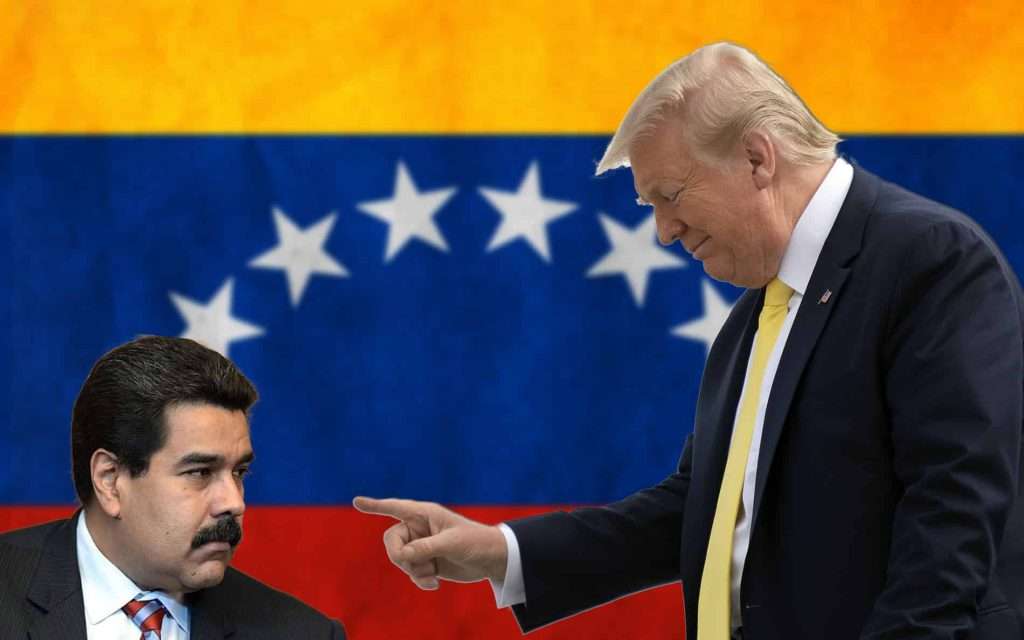Beyond the ‘War on Drugs’: Trump’s real target in Venezuela

The United States has been steadily increasing its military presence in the Caribbean over the past two months, the most recent reinforcement was a US warship that arrived in Trinidad and Tobago on October 26, as reported by The National. Trump claims that this is a part of his war on Venezuelan “narco-terrorists”, however it appears to be a part of a broader campaign to weaken and intimidate Venezuelan President Nicolás Maduro whilst encouraging regime change from within his circle of power.
According to open-source tracking analysed by BBC Verify, at least ten US vessels were active in the area as of October 23, among them guided missile destroyers, amphibious assault ships, and refuelling tankers. Satellite imagery also showed the USS Lake Erie and the MV Ocean Trader positioned east of Trinidad and Tobago, the latter known to support US special forces operations.
The US Air Force has confirmed “bomber attack demonstrations” by long-range B-52s off Venezuela’s coast, while F-35 stealth fighters and MQ-9 Reaper drones have been sighted in Puerto Rico. These aircraft, typically associated with covert operations in the Middle East, suggest a level of readiness far beyond routine counter-narcotics missions.
President Donald Trump has framed the operation as part of a war on drug trafficking. The US has destroyed several small vessels alleged to be smuggling narcotics or “narco-terrorists” from Venezuela, though it has not released details or evidence regarding the victims or the cargo. Critics across Latin America have condemned the strikes and questioned their legality, arguing that they appear intended more to intimidate the Venezuelan government than to disrupt drug flows.
Dr Christopher Sabatini, a senior fellow for Latin America at Chatham House, stated that “this is about regime change. They’re probably not going to invade, the hope is that this is about signalling.” He suggested that Washington’s show of force aims to “strike fear” in Maduro’s military leadership and prompt internal defections, BBC News reports.
Meanwhile, the US has intensified its political pressure. It has also raised the bounty for information leading to Maduro’s arrest to $50 million, a move widely interpreted as an incentive for his inner circle to betray him. Yet Venezuela’s elite, enriched by corruption and shielded by the country’s oil wealth, has little reason to defect. The price on Maduro’s head is twice as much as the bounty for Osama Bin Laden in 2001, following the 9/11 attacks, indicating how important the overthrow of Maduro is for the Trump administration.

While Washington insists its campaign targets narcotics networks, the evidence and intention point elsewhere. The US appears to be using the language of counter-narcotics enforcement to justify a broader strategy, one designed to isolate Maduro diplomatically, pressure his military, and set the stage for regime change in Caracas.
Venezuelan politician María Corina Machado, who recently won the Nobel Peace Prize for unifying political opposition to Maduro, has consistently advocated for the privatisation of Venezuela’s oil fields.
Venezuela has the largest oil reserves in the world, which is almost entirely controlled by PDVSA (Petroleos de Venezuela, SA), Maduro’s state-owned oil company. It cannot be denied that Maduro is an authoritarian dictator, however time and time again, the United States has toppled regimes across the world under the guise of democracy and freedom, when in reality, the goal has been to install a pro-western regime who will allow their national resources to be extracted by privatised multi-national companies.
If the US was to bring about regime change in Venezuela, it would mirror the 1953 coup in Iran that was orchestrated by the CIA, which ousted Iran’s first democratically elected leader, Mohammad Mosaddegh, laid the foundation for the Islamic revolution in 1979, and opened up Iran’s nationalised petroleum industry to the global capitalist system of resource extraction.
The National, BBC News, Britannica, CBC, Maghrebi.org
Want to chase the pulse of North Africa?
Subscribe to receive our FREE weekly PDF magazine










